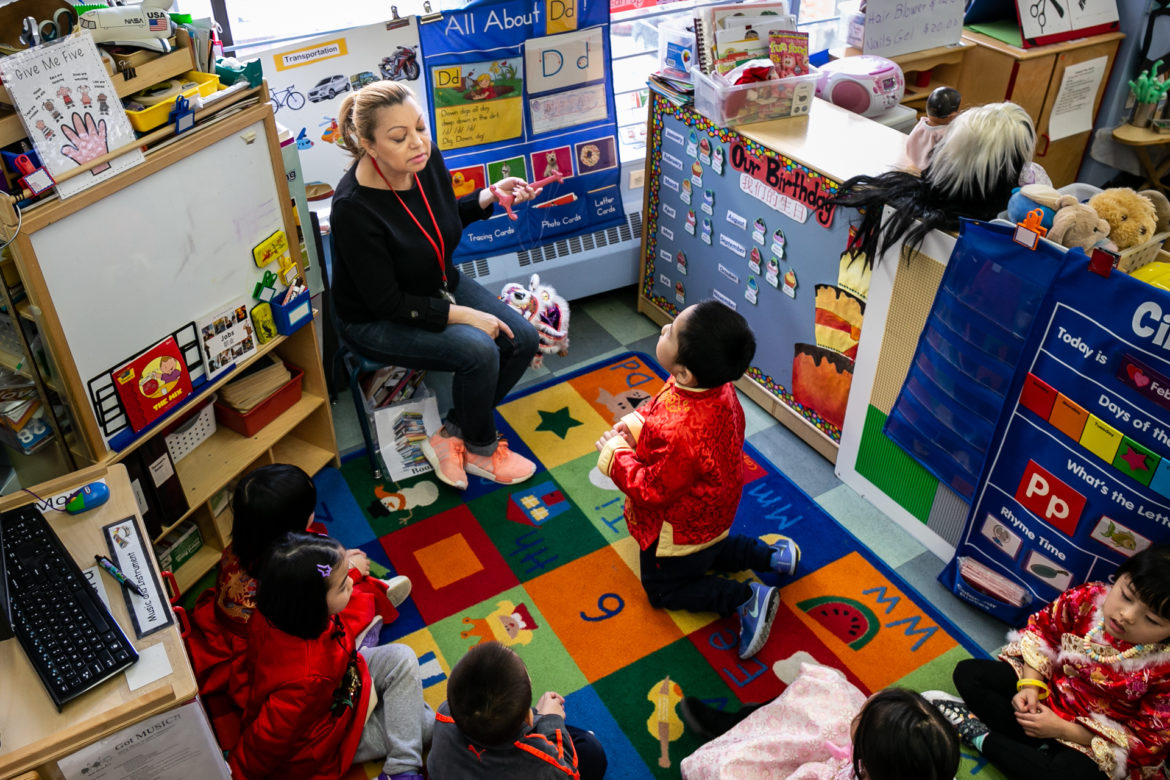“It is easy to see how mothers are affected by the prohibitively expensive costs of child care, but perhaps less so to understand it as a communal crisis.”

Adi Talwar
A Universal Pre-K class in downtown Manhattan in 2019.As a researcher and a sociologist focused on class and child care in New York City, I am well aware of how our current system of expensive privatized care puts parents on the frontlines of the child care crisis.
As we think about what to give moms this Mother’s Day, forget about candles and hand lotions. What mothers really need is greater political and personal commitment to universal child care from everyone. Better still, not only is this the perfect gift for moms, it is a present that will benefit all of us, whether we have children or not.
In the midst of New York’s child care crisis, families are suffering, mothers most of all. Mothers across incomes have paused their careers, considered leaving the city, and even delayed or decided against having more children because of the untenable cost of child care. The U.S. Department of Labor’s Women’s Bureau reports median annual costs for child care in New York City reaching nearly $24,000 per child. This is more than the median annual rent in the city and nearly three times the cost of in-state tuition at a public university. Worse still, child care costs are only continuing to rise, according to the U.S. Census Bureau.
This issue is especially relevant and politically charged for New Yorkers as the fates of universal 3-K and Pre-K have been mired in uncertainty since Mayor Eric Adams began cutting almost $400 million to these programs since he entered office. While the mayor, thanks to public outcry from parents and support from the City Council, restored some funding in his upcoming budget, there is no guarantee from the mayor that he is truly dedicated to rolling out the universally available free 3-K programs that parents were promised.
While the suspension of cuts to early childhood education funding is a big win, the ways in which this funding was restored—namely by the mobilization of already overworked and overwhelmed parents—reveals a deeper and more insidious injustice: we view child care as a personal problem, one that is relevant and of interest only to parents.
I have seen this bias repeatedly over the last six months as I have conducted my doctoral research about mothers’ child care needs and frustrations. As a female researcher in her early 30s, it is almost invariably assumed by study participants as well as colleagues that I am a mother myself. The fact that I am childless is often met with surprise and confusion. This reveals the extent to which, on a societal level, child care has been internalized as a mother’s issue. However, as a sociologist, I can attest that it is, in fact, a social problem that needs and deserves broad community action.
It is easy to see how mothers are affected by the prohibitively expensive costs of child care, but perhaps less so to understand it as a communal crisis. It is no secret that lack of universal child care is a source of gender and economic inequality as parents, most often mothers, are pushed out of the workforce to provide child care.
However, this trend has ripple effects far beyond the direct impacts on mothers. As parents shoulder the burden of child care themselves, families are forced to limit their spending elsewhere and even consider moving out of the city. A Manhattan-based mother tells New Yorkers United for Child Care (NYUC)—a nonprofit dedicated to protecting and expanding universal child care in New York City—“We have been forced to spend much more than planned on child care and cut down on spending in our community and city.”
Due to high child care costs, families are working less and spending less, and a report by the 5BORO Institute confirms that the economic well being of our city is significantly impacted. In 2022 alone, the city lost $23 billion dollars in economic activity due to parents cutting back on both work and spending to address child care needs. These macro-level economic trends caused by the lack of child care in New York City hurt all of us—parents and nonparents alike.
The success of parents in halting funding cuts to early childhood education proves how powerful New York City constituents are. However, as long as we conceptualize child care as an individual responsibility, parents will continue to fight an uphill battle. Meanwhile, lack of universal child care contributes to higher poverty rates, lower taxable incomes, and reduced spending, and our entire city suffers the consequences.
For the health not only of our city’s children, but our city itself, it is imperative that we all get involved. This Mother’s Day, we can take some of the burden off of mothers by reframing access to universal, high-quality child care as a societal issue that is relevant to all of us. Now is the time to join the fight in expanding early child care for all New Yorkers.
Get involved with NYUC and sign the petition to expand universal early child care in New York City here.
Talya Wolf is a doctoral candidate in sociology at the City University of New York’s Graduate Center. Her research focuses on class and child care in New York City, with the goal of better understanding how universal child care can mitigate inequality and support families across the income distribution.








